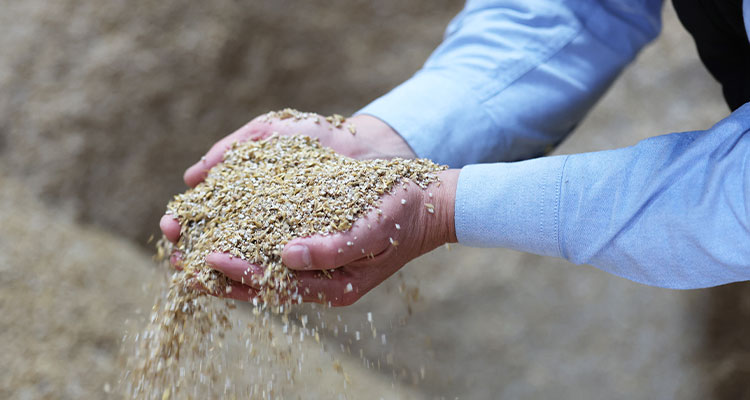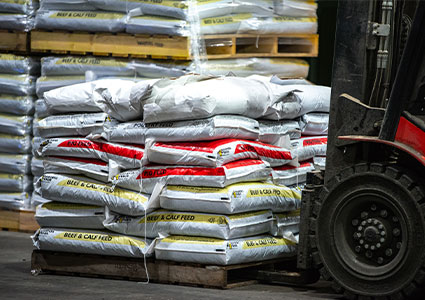
How Harpers Feeds cares for the animals that feed the nation
Combining exceptional local knowledge, customer service and attention to detail with outstanding technical expertise, Harpers Feeds produces high-quality animal feeds that are trusted by farmers throughout the UK’s South West. Acutely aware that every farm has different requirements, the company prides itself on making products that suit each specific system and species, whether ruminant or monogastric. With a staggering output of 170,000 tons of animal feed annually, Harpers Feeds still manages to maintain consistent quality in its products thanks to its fixed formulations. This way, it ensures that every load of feed is exactly the same as the last so that customers know what to expect. We have the pleasure of speaking with Kynan Massey, Managing Director at Massey Feeds Group (Massey), Harpers Feeds’ holding company. Kynan kicks off the conversation with an informative overview of Harpers Feeds’ history.
“Harpers Feeds was established in 1992 by Bill Harper in northwest Devon, where he saw a gap in the market for feed sales to local farms. In 2012, Harpers Feeds joined Massey Feeds and together, they positioned themselves at the heart of the farming community, not just in the southwest, but also in northwest and central England. Massey Feeds is a sixth-generation family business, founded nearly 150 years ago in England’s northwest, renowned for investing in agriculture, people and technology,” he opens. 
“At Massey Feeds, we manufacture the highest quality animal feeds using the best raw materials and deliver them directly to farms to provide exceptional service to our customers. This commitment to and reputation for quality has formed the solid foundation upon which we have built our customers’ trust. Seven years ago, we built a farm supplies store on the Harpers Feeds site in northwest Devon to not only cater to the local farming community with animal feed, but to all our customers’ consumable needs across the entire country. I am quite proud and excited that the sixth generation of my family is now involved in the business,” Kynan adds.
Glen Johns, Sales Director, joins the conversation to reveal the reasons why so many farmers trust Harpers Feeds as their supplier of choice. “Harpers Feeds is based in the center of the Dartmoor, Exmoor and Bodmin Moor regions, which are primarily grassland farms dedicated to dairy, beef, and sheep production. It is very important to us that we give our customers the best nutritional and technical support to help their farms be successful. To this end, all our sales reps are nutritionists who are Feed Adviser Register (FAR) trained, allowing them to provide accurate and effective nutritional support on the farm. All of our feeds have fixed formulations, which is what farmers tend to prefer, and we were the first company in the UK to offer soya- and palm-free feeds. Seven years ago, we built a Massey Harpers Farm supplies store (which will eventually become the Massey Harpers Farm Country Store) offering a wider product selection in the farm consumables market and serving as our customers’ one-stop shop for all their farming and countryside needs. Additionally, we now deliver throughout the UK with our e-commerce website,” he states.
Enhancing efficiencies
Speaking of Harpers Feeds’ new e-commerce website, Theia Farrow, Marketing Officer, explains how the company has expanded its online presence over the last few years. “The first step we took was to enhance our social media presence by creating and posting technical videos to assist and support our customers. Then, we developed our website, concentrating initially on the feed side of the business, followed by the shop side. Our main strategy has always been focused on raising awareness, increasing our profile within the farming community, and promoting the high quality products we offer to our customers. By doing so, we aim to be seen as a progressive company within the industry, as we explore cutting-edge technologies and find new ways to help our clients and improve their businesses.
“A couple of years ago, we started putting significant effort into developing the Massey Harpers e-commerce store. As Glen mentioned, we made so much progress that we are now able to deliver a huge range of products directly to our customers’ farms across the UK. In essence, this marketing push is all about supporting the farming community and identifying ways to help their businesses grow and develop,” she enlightens.
 In line with its dedication to staying ahead of the curve and moving with the times, Harpers Feeds has made various investments poised to boost its efficiency even further. “I am committed to constantly investing in the business in each of our locations around the UK. These investments are very important, as they enable us to remain at the forefront of the industry. For instance, we have a large fleet of lorries that need to be kept up to date regularly. To run them sustainably, we minimize empty miles and use renewable energy and fuels whenever possible. Recently, we completed a solar project in Devon, which increased our energy efficiency by preventing us from using too much energy from the grid, thereby decreasing our carbon footprint.
In line with its dedication to staying ahead of the curve and moving with the times, Harpers Feeds has made various investments poised to boost its efficiency even further. “I am committed to constantly investing in the business in each of our locations around the UK. These investments are very important, as they enable us to remain at the forefront of the industry. For instance, we have a large fleet of lorries that need to be kept up to date regularly. To run them sustainably, we minimize empty miles and use renewable energy and fuels whenever possible. Recently, we completed a solar project in Devon, which increased our energy efficiency by preventing us from using too much energy from the grid, thereby decreasing our carbon footprint.
“One of our most significant current projects consists of replacing the two grinders in our mill with some featuring newer, more efficient motors. These motors will not only use less energy but will also increase the capacity and overall efficiency of our mill. Within our farm supplies business, Massey Harpers Farm Supplies, we are investing in a large warehouse and yard. At the moment, we are storing our products in off-site storage nearby which is not ideal. The new warehouse is going to bring all of our stock back to a single site, making it easier for our staff and reducing the need for double handling,” informs Kynan.
Improving performance
Aside from promoting sustainability internally, Harpers Feeds encourages farmers to do the same through its range of soya and palm free feed. “Within our Planet Range, we offer dairy, beef, sheep, pig, and poultry compounds and blends. Furthermore, we provide a comprehensive selection of dairy feeds designed to help reduce the carbon cost of dairy farming, as they are made with more environmentally friendly ingredients. Indeed, we have removed the ingredients most closely associated with high carbon emissions on farms and with the highest environmental consequences, such as soya products and palm oil products or derivatives. We have replaced these ingredients with high quality, domestically produced ingredients that all farmers are familiar with, namely protected rapeseed, sugar beet, field beans, wheat distillers and wheat feed. The Planet Range has been developed to deliver the best quality feeds for high-producing livestock, but with less environmental impact and lower food miles. In fact, it has been successfully fed on our farms since 2019,” Glen continues.
As we edge closer to the end of our conversation, Kynan unveils his vision for Harpers Feeds’ future. “Although our business has experienced considerable growth by feeding the animals that feed the UK, we would like to expand our horizons both at home and abroad. Nevertheless, seeing the next generation of the family starting to make their mark in the company is very satisfying to me. In five years, they too will have a say in our future aspirations,” he ends.